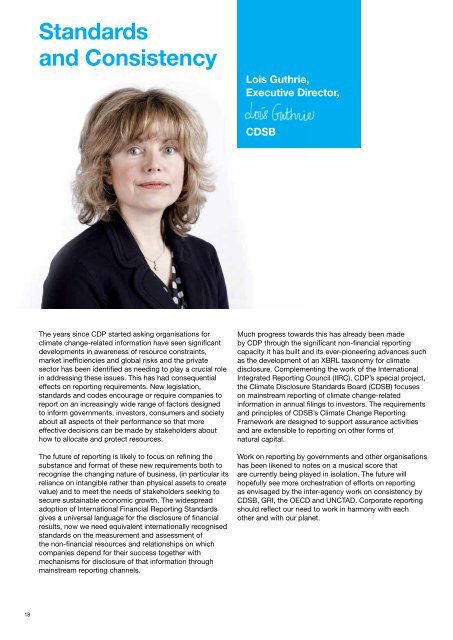CDP-FTSE-350-Climate-Change-Report-2012
CDP-FTSE-350-Climate-Change-Report-2012
CDP-FTSE-350-Climate-Change-Report-2012
Create successful ePaper yourself
Turn your PDF publications into a flip-book with our unique Google optimized e-Paper software.
18<br />
Standards<br />
and Consistency<br />
The years since <strong>CDP</strong> started asking organisations for<br />
climate change-related information have seen significant<br />
developments in awareness of resource constraints,<br />
market inefficiencies and global risks and the private<br />
sector has been identified as needing to play a crucial role<br />
in addressing these issues. This has had consequential<br />
effects on reporting requirements. New legislation,<br />
standards and codes encourage or require companies to<br />
report on an increasingly wide range of factors designed<br />
to inform governments, investors, consumers and society<br />
about all aspects of their performance so that more<br />
effective decisions can be made by stakeholders about<br />
how to allocate and protect resources.<br />
The future of reporting is likely to focus on refining the<br />
substance and format of these new requirements both to<br />
recognise the changing nature of business, (in particular its<br />
reliance on intangible rather than physical assets to create<br />
value) and to meet the needs of stakeholders seeking to<br />
secure sustainable economic growth. The widespread<br />
adoption of International Financial <strong>Report</strong>ing Standards<br />
gives a universal language for the disclosure of financial<br />
results, now we need equivalent internationally recognised<br />
standards on the measurement and assessment of<br />
the non-financial resources and relationships on which<br />
companies depend for their success together with<br />
mechanisms for disclosure of that information through<br />
mainstream reporting channels.<br />
Lois Guthrie,<br />
Executive Director,<br />
CDSB<br />
Much progress towards this has already been made<br />
by <strong>CDP</strong> through the significant non-financial reporting<br />
capacity it has built and its ever-pioneering advances such<br />
as the development of an XBRL taxonomy for climate<br />
disclosure. Complementing the work of the International<br />
Integrated <strong>Report</strong>ing Council (IIRC), <strong>CDP</strong>’s special project,<br />
the <strong>Climate</strong> Disclosure Standards Board (CDSB) focuses<br />
on mainstream reporting of climate change-related<br />
information in annual filings to investors. The requirements<br />
and principles of CDSB’s <strong>Climate</strong> <strong>Change</strong> <strong>Report</strong>ing<br />
Framework are designed to support assurance activities<br />
and are extensible to reporting on other forms of<br />
natural capital.<br />
Work on reporting by governments and other organisations<br />
has been likened to notes on a musical score that<br />
are currently being played in isolation. The future will<br />
hopefully see more orchestration of efforts on reporting<br />
as envisaged by the inter-agency work on consistency by<br />
CDSB, GRI, the OECD and UNCTAD. Corporate reporting<br />
should reflect our need to work in harmony with each<br />
other and with our planet.


